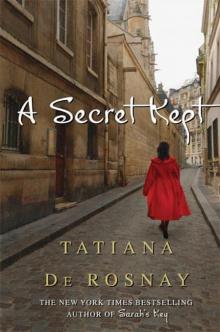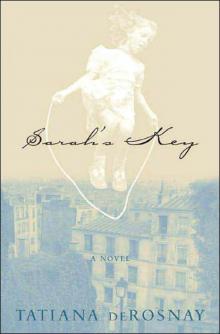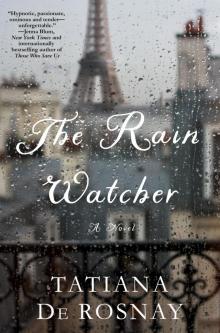- Home
- Tatiana de Rosnay
The Other Story Page 3
The Other Story Read online
Page 3
Three days. Three blissful days. Three days just for him. This beautiful, quiet haven. The blue of it. No one knows where he is. He did not even Tweet it, refrained from posting it on his Facebook wall. Should he be needed, his BlackBerry is there to do its job. “Have a good rest, signor,” the beach attendant had said, beaming as she spread out a towel for Nicolas on the deck chair. Three days to pretend to be writing the book. Three days of laziness.
Malvina opens one eye as he is drying himself.
“You should have a swim,” he says.
She shrugs. “I don’t feel too good.”
“Maybe something you ate?”
“Maybe.”
She nestles back into her deck chair.
It is getting on toward noon. The sun pounds down. The frizzy brunette and the hairy guy arrive. He is still on the phone (is he ever off it?), and she totters on her glittery platform shoes. Once they have decided where to sit, once they have been handed the thick black-and-white towels stamped with the letters GN, she stands up. Slowly and tantalizingly, she takes off the top of her bathing suit, like Rita Hayworth removing that glove. Her breasts are round and pert, with dark pink nipples. Not fake bosoms, but glorious real ones that wobble ever so slightly and that Nicolas can imagine frantically cramming into his mouth. She starts to anoint them with sun oil, and Nicolas can hardly believe she is doing this, right here, right now, with such deliberate, slow movements. All the men are staring. The staff members seem transfixed, sweating under their black shirts. The Belgian goes pinker, the Swiss adjusts his dark glasses, and the French ogles to such an extent that his wife gives him a dig in the ribs. Only the boyfriend seems impervious to the scene. Nicolas neatly takes his eyes off her just before Malvina notices.
Nicolas has learned to be clever where Malvina is concerned. Her intensity harbors a powerful strain of silent jealousy. She picks up the remotest sign of what she imagines is danger—an overadmiring fan, a too-friendly reader, or simply a pretty girl. When Malvina left London two months ago, giving up her studies and all her friends there, to come to live with him in Paris on the rue du Laos, Nicolas discovered her unhealthy obsession with his past, with his relationship with Delphine. He found it impossible to make Malvina understand that Delphine and he have been friends for the past two years, since their breakup, and that he needs this special bond with his ex. Malvina cannot fathom how he can be “friends” with Delphine. She is convinced Nicolas and Delphine are still lovers. And any reasonably attractive woman is a threat to her relationship with Nicolas.
As a result, his BlackBerry never rings or even vibrates. He is too careful for that. He gave up his beloved iPhone when he started dating Malvina in 2010. The iPhone 3GS, he told a friendly male journalist in Oslo, is an unfortunate device if you are being spied upon by a jealous partner. Picture messages show right up on the screen, along with the name of the person sending them, as well as missed calls. A nightmare. “Switch to a BlackBerry if you have secrets to keep,” he had said, chuckling. Malvina had not seen the Norwegian article with that exact caption and a picture of him brandishing his BlackBerry over a shot of Løiten Linie Akevitt. A small miracle, considering she spent hours keeping track of him online, checking every comment he posted on Facebook and Twitter, and, worse still, every comment posted by a female in response. He had 150,000 followers on Twitter and over 250,000 on his Facebook fan page, so Malvina was certainly busy.
His BlackBerry is protected by a code he changes constantly. The only sign of an incoming text or e-mail is the little red signal that blinks. The screen remains black. Nothing shows up on it. He knows how to look at the phone swiftly when Malvina is occupied with another matter. It is a risky daily battle. He knows how to smuggle the BlackBerry into the bathroom, tucked into his sleeve like a stash of drugs. In the privacy of the toilet, he knows how to hastily peruse his e-mails, his text messages, check his Facebook page, scroll through his Twitter feed. This morning, as Malvina visits the ladies’ room (that will leave him four to five minutes), he sees there are new e-mails on his private account—one from Alice Dor, his French publisher; one from Dita Dallard, his publicist; one from Bertrand Chalais, a French journalist he is friendly with; another from a writer friend, Patrick Treboc, whom he parties with. And on his other e-mail account, the one used for his Web site, there are about fifty new messages from readers around the world. He used to answer them all in the beginning, when the book was just out, not yet on the charts or translated into all those languages. When he first started to receive the e-mails, they were a gratifying surprise. But when the messages poured in as the book gained recognition in more countries, on more charts and lists, and when the movie came out, he found he was swamped. “Hire an assistant who will answer them for you,” suggested another writer friend, but Nicolas felt that wasn’t right. “Just read them and don’t reply,” said another. And that was what he ended up doing.
This morning, the most important element on Nicolas’s BlackBerry is the blue-spotted logo on the screen. A BBM. He knows it is from Sabina. He will not have time to answer right now, but he reads it fast (heart pumping) and erases it promptly. “I am wearing nothing, it is hot in my room, and I am thinking of you. Shall I tell you what I am doing right now, Nicolas?” He has to delete every single message from Sabina as soon as he reads it. There is no other way.
Last April. Berlin. A book signing at the Dussmann das Kultur Kaufhaus on Friedrichstrasse. She had stood in line patiently for a long while. She had handed him Der Umschlag (German edition, with the postcardlike sepia cover of Camogli in the fifties, a glimpse of sea, the village clustered by the cliff, the inky green cypress trees). He had said blandly, “Your name, please?” like he always did, and she had answered, “It’s not for me; it’s for my husband. His name is Hans.” There was something about her eyes. An ash blonde wearing a trench coat. Fifteen years older than he was, he guessed. Fine catlike features, small smile. Reminiscent of Charlotte Rampling in The Night Porter. He had signed the book. Just as she was turning away, she swiftly slipped a shred of paper into his hand. Then she was gone and the next reader was already flourishing his book. He hadn’t had the time to read the paper till twenty minutes later, when his German publisher, Ursula, managed to pluck him away from the winding line of readers for a short break. The only thing written on the paper was a series of numbers he immediately recognized—a BlackBerry PIN number, BBM, for instant messaging.
Later that night, after a never-ending event at the Institut français on Kurfürstendamm with a fastidious journalist who asked only the most obvious questions, the ones he could no longer face answering but knew he had to (“How much of the book is taken from your own life?” “Did you ever find a letter like that for real?” “Is Margaux Dansor modeled after your mother?” “How did your family react when it was published?” “Did Toby Bramfield buy the rights the week the book came out?” “Is it true you have a cameo in the movie?” “What is your second book about?”), he got back at last, very late, to the refined privacy of his junior suite at the Ritz-Carlton on Potsdamer Platz. He kicked off his shoes, turned on the TV, zapped through the late-night news and porn channels, delved into the minibar for champagne, and sprawled out on the sofa, shoving aside boxes of chocolates, welcome cards, baskets of goodies, books to sign for the sales reps. It was too late to call Malvina. He’d do that in the morning. He took the scrap of paper from his pocket and stared at it for a while. On the TV screen, a frenzied threesome was going at it with gusto. He turned the sound down, had a gulp of champagne, watched them for a while. Then he typed the BBM PIN code into his phone.
He should not be doing this, he knew. That catlike green-eyed woman spelled trouble.
JOURNALISTS APPEARED TO BE fascinated, almost morbidly so, by his father’s death in 1993, as if that episode represented the core of his inner self, his essence. They craved each detail of the day his father died, or, rather, the awfulness of the precise moment when his father disappeared, when it was understood that h
e was not coming back, and how, as an eleven-year-old boy, Nicolas had undergone such trauma. Before Hurricane Margaux, Nicolas had not talked about Théodore Duhamel’s death to anyone, not even to his ex, Delphine. It had been difficult choosing the right words, strange feeling them roll around his mouth for the first time like a foreign dish his palate balked at. But then he discovered, with a sort of secret pleasure, that the more interviews he gave, the more Théodore Duhamel took on a new, virtual existence, an unexpected renaissance. His words resuscitated his father, fleshed him out, dusting away the forlorn mantle of stiffness that had settled with the passing of time, brandishing the triumphant and true image of what Théodore Duhamel used to be. “My father was my Gatsby,” he once confided in an early interview, and Lord knows how many times that line had been quoted, copied, Tweeted. When asked to describe Théodore Duhamel, Nicolas was discouraged. How? Listing his height, the blaze of his blue eyes, his square chin, his long, gangly arms and legs wasn’t enough. Even photographs of Théodore Duhamel posing with Nicolas, age six, in front of the battered but elegant silver Jaguar E-Type, a cigar emerging from the white of his smile, or standing astride his black Hobie Cat at the Miramar beach in Biarritz, did not suffice. How to describe the way women would look at his father, all women, young and mature, staring at him? Nicolas suspected the journalists would never grasp the complexity of Théodore Duhamel’s seemingly sunny personality, simply because no one had, not even his wife or his son. Théodore Duhamel was a scintillating comet that seared through the fragile canvas of his son’s boyhood, an alpha and an omega of interrogation and perplexity, an alluring realm of uncertainty, a no-man’s-land of chiaroscuro where legend and reality intertwined. “Is it true your father has no grave?” was one of the favorite questions. And Nicolas invariably replied, “Well, his name is on my grandparents’ tombstone at Père-Lachaise, but as his body was never found, technically, yes, my father has no burial place.”
The earliest memory Nicolas had of his father was his voice. A nasal voice, loud, sometimes irritating, that rang in one’s ear like the rich toll of a bell. And the laugh! High-pitched, sensual, at times reduced to a short howl or a snort. It took people by surprise. Théodore Duhamel used it like a weapon. He wielded it artfully, Nicolas discovered, in delicate situations—with uptight teachers, ungracious shop assistants, frosty bankers. Most of the time, it worked. But that ploy infuriated his mother, his grandmother. They saw through it. When Théodore Duhamel winked at his son over the dinner table, flaunting a down-turned mouth as if to convey, Those women! Nicolas shivered with pride; yes, he was part of the team, just the two of them, the secret team he formed with his father, like Paul Newman and Robert Redford in Butch Cassidy and the Sundance Kid, his father’s favorite movie. He was Sundance; his dad was Cassidy.
What did his father do? From early on, Nicolas slowly grasped to what extent his job was shrouded in mystery. His father did not leave every morning wearing a suit and a tie, carrying a briefcase, like François’s father, kissing his wife good-bye on the doorstep. It was his mother, Emma, who took off when it was still dark, a chunk of croissant crumbling from her fingers, rushing in order not to be late for her students. Théodore Duhamel did not make an appearance till ten, and the puffy-eyed look he harbored in the mornings was another of Nicolas’s earliest memories. “What does Papa do?” he asked his mother when he was eight or nine, as he never knew what to write in the school forms that asked for his father’s profession. “Hmm,” reflected his mother, “why don’t you ask Papa?” (Nicolas could have been imagining things, but wasn’t there a smile hovering on her lips?) So Nicolas obediently asked his father outright while Théodore was watching the news, a glass of whiskey in hand, and his father had replied, eyes glued to the screen, “I can’t describe what I do. It doesn’t boil down to one word.” Nicolas felt a lump in his throat. What was he going to tell his school? Couldn’t he leave that entry out? Only write Mother’s profession: Teacher. Did they really have to know what his father did for a living? Théodore Duhamel finally glanced over at his son, took note of his distress, and gulped his whiskey down with relish. “Just write ‘entrepreneur,’ Sundance. That will do the trick.” Nicolas nodded. “How do you spell it?” His father spelled it out slowly. Nicolas had no idea what it meant. He asked tentatively, “What is an entrepreneur?” His father poured out another whiskey and ignored that question. Then after a moment of silence, he added, “If anyone asks you, just say you can’t give any details because it’s too dangerous.” He’d lowered his voice to a whisper. Nicolas felt the thrill run up and down his spine, and he nodded. Later, he looked up the word entrepreneur in the dictionary. “A person who organizes and manages a commercial undertaking, especially one including a commercial risk,” he read. The definition made Nicolas feel even more puzzled. His father had no office. The dining room was his lair; he would sit in there for ages, staring at the television even if it was turned off, puffing away at a cigar.
The bitter smell invariably brought his father back in a flash. Théodore Duhamel was fussy about cigars. He refused to buy them anywhere but at the Davidoff shop on the avenue Victor Hugo, where he spent hours choosing between a Monte Cristo N°2 (obus), an Upmann Sir Winston, and a Hoyo de Monterrey Excalibur Legend Crusader. Théodore Duhamel did not like being interrupted when he chose them, except by the vendor or a pretty woman. Nicolas noticed that pretty women often came to the shop. They waited, bored and beautiful, as the usually short, bald, and ugly men they accompanied also took their time. Nicolas had often watched his father chat up the ladies. Most ingenuously, he would hand a Havana to the lady, and sometimes the lady would stroke it in a slow and strange manner. Often, he would slip his card to the smiling lady behind the fat, bald man’s back. His father’s card was dashing. In bold red lettering, it said Théodore Duhamel, International Entrepreneur. Nicolas often heard him on the phone while Emma was out, using a suave, low voice, and expressions like “my beauty,” “my lovely,” and he had seen how his father looked at women in the streets, his eyes raking over them, that smile on his lips. Did his mother know about this? Did she mind?
Théodore Duhamel had a business acolyte, a guy Nicolas had seen around the house since childhood. His name was Albert Brisabois, but his father only ever called him Brisabois. He was a short, sturdy fellow with a fleecy ginger beard and a paunch. When Nicolas got home from school, Brisabois and his father were usually locked up in the dining room. Smoke wafted from under the closed door. His father’s loud snort was heard from time to time above the low murmur of voices. When his mother arrived, she would glance at the closed door, raise her eyebrows, and say, “Hmm … your father is working. Don’t make any noise.” (Nicolas could have been imagining things yet again, but wasn’t that another discreet smile?) He would share a quiet dinner with his mother in the kitchen, just the two of them, which he rather liked, while Théodore Duhamel and Brisabois pursued their conversation. “What are they talking about?” he once asked his mother as his father’s shout of a laugh echoed down the corridor. “Business,” she replied matter-of-factly over the leek and potato soup. And Nicolas was left to muse about what “business” really meant.
One Saturday, Nicolas and his father were walking down the Champs-Elysées on their way to lunch at the Pizza Pino. Théodore Duhamel suddenly gasped, turning a horrid shade of white. He pushed his son to one side and ducked. “Sundance, I’ve spotted an enemy. We need to go undercover.” At first, Nicolas thought his father was joking, but his face was ghastly, so pale that Nicolas felt frightened. He was shoved into the nearest shop. His father pretended to examine an array of silk scarves with marked interest. He did the same. His father waved off an obsequious saleslady. “Whatever you do, don’t turn around.” His father’s voice was normal, a trifle subdued, but the livid hue of his face was terrifying. Nicolas stared at the scarves (years later, he can still remember their design: pink and purple, rather hideous, nothing his mother would ever wear), and it seemed to him that they stood the
re for ages, petrified. Finally, after an eternity, his father muttered, “All clear. Let’s get the hell out of here.” They fled the shop, hand in hand, faces down, the collar of his father’s coat raised around his neck like a shield. Théodore Duhamel’s complexion had gone back to normal, and Nicolas felt relieved. His father dashed into Fouquet’s, dragged Nicolas down a flight of stairs, and plonked his son onto a chair. “Wait for me here. Won’t be long.” His father disappeared into a phone booth. Nicolas could hear his voice quite clearly. “Brisabois. It’s me. I saw him on the Champs-Elysées.” A long silence. “What the fuck are you going to do about it? Have you thought about the consequences? Have you really? Do you have any idea—” Another long silence. “I pray to God that you are right.” Then his father replaced the receiver as loudly as possible, as if to convey the enormity of his irritation to Brisabois at the other end of the line. After their ritual Regina pizza, on their way home in the metro (Théodore Duhamel rarely drove the battered but elegant E-Type in town, only out of it), Nicolas timidly asked his father who it was he had seen. His father grinned down at him and said, “All is under control. No worries.” But Nicolas did worry. When he got home, he did not breathe a word of what had happened to his mother, although he longed to.
Another mystery was his father’s relationship with his mother. After her husband’s death, Emma Duhamel had stated (and Nicolas had heard her say it) that Théodore Duhamel was the love of her life. But during the eleven years that Nicolas had shared of his father’s existence, there were few memories of a loving and passionate marriage. He eventually understood that his father had had affairs and that his mother had ignored them. Had she suffered? Had she had affairs, as well, more discreetly? When they met, in 1980, Emma was twenty-one, a brilliant philosophy student, and Théo was twenty, working in the photo department at Paris Match magazine. They met in a nightclub, Castel, on the rue Princesse and fell promptly in love (even though Emma was going out with a Belgian guy she’d met at the Lycée-le-Grand, and even though Théo was dating a Norwegian model named Janicke, who had graced the cover of Elle). They married because he, Nicolas, was on the way. It seemed to Nicolas that his mother put up with his father, that she treated him like a child prone to tantrums. Emma was only thirty-four when her husband disappeared. There were other men, but no one important enough for Emma ever to consider another marriage.

 A Secret Kept
A Secret Kept Sarah's Key
Sarah's Key A Paris Affair
A Paris Affair The Other Story
The Other Story The House I Loved
The House I Loved The Rain Watcher
The Rain Watcher